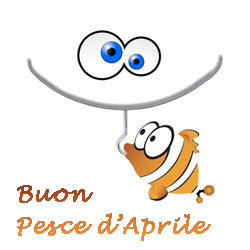Happy April Fool’s Day!
 {English below} Occhio alle spalle, il primo aprile, il giorno degli scherzi e delle notizie incredibili: i pesci d’aprile sono in agguato ovunque, a casa come in ufficio ma anche su internet, sui giornali ed in tv. Creduloni e non di tutto il mondo state attenti, siete avvisati.
{English below} Occhio alle spalle, il primo aprile, il giorno degli scherzi e delle notizie incredibili: i pesci d’aprile sono in agguato ovunque, a casa come in ufficio ma anche su internet, sui giornali ed in tv. Creduloni e non di tutto il mondo state attenti, siete avvisati.
Ma come nasce questa strana “festa” che tanto abbiamo temuto soprattutto ai tempi della scuola? Il pesce d’aprile si dice “poisson d’avril” in Francia, “pescado de abril” in Spagna, ed e conosciuto anche come “April Fool’s day” (che in inglese significa “giorno dei buffoni di aprile”).
È una festa dedicata agli scherzi che si celebra, per così dire, oltre che in Italia, anche in Francia, Germania, Regno Unito, Stati Uniti, Brasile fino ad arrivare in Giappone.
Ci sono molte storie sulla nascita di questa bizzarra ricorrenza. L’ipotesi più convicente pare sia quella che l’idea di accostare gli scherzi a questa data abbia preso corda durante il regno di Carlo IX di Francia.
 Verso la metà del XVI secolo, in tutta la Francia le celebrazioni del nuovo anno cominciavano il 25 marzo e finivano una settimana dopo, il 1 aprile appunto. Nel 1564, attraverso il decreto di Roussillon, il re decretò l’adozione del calendario gregoriano facendo diventare così il primo giorno dell’anno il 1 gennaio.
Verso la metà del XVI secolo, in tutta la Francia le celebrazioni del nuovo anno cominciavano il 25 marzo e finivano una settimana dopo, il 1 aprile appunto. Nel 1564, attraverso il decreto di Roussillon, il re decretò l’adozione del calendario gregoriano facendo diventare così il primo giorno dell’anno il 1 gennaio.
La leggenda vuole che molti francesi o contrari a questo cambiamento o che semplicemente se ne dimenticarano, continuarono a scambiarsi regali, festeggiando durante la settimana che terminava con il 1 aprile.
Dei burloni però decisero di ridicolizzarli, consegnando regali assurdi, organizzando feste inesistenti, facendo nascere così la tradizione di fare scherzi il primo giorno di aprile.
Il nome “Pesce d’aprile”, che si rivolge alla vittima degli scherzi, deriva dallo zodiaco: qualsiasi evento accaduto in quella data era relazionato con il fatto che il Sole lasciava la costellazione dei Pesci.
Da qui l’usanza di “festeggiare in modo insolito” il primo aprile si è diffusa in tutto il mondo, assumendo connotazioni particolari nei vari paesi. Ad esempio, come in parte già vi abbiamo raccontato, i nostri cugini francesi utlizzano simbolicamente l’immagine del sole, nel suo passaggio dal segno dei Pesci a quello dell’Ariete.
Gli anglosassoni invece connotano questa giornata con l’espressione “April fool’s day”, letteralmente il giorno dello sciocco di aprile. Secondo qualcuno la parola fool dovrebbe indicare un folletto di origini medievali.
Nella Scozia delle highlands invece, il pesce d’aprile ha una curiosa appendice nel Taily Day, ovvero giorno delle natiche, durante il quale, ci si diverte ad attaccare sulla schiena dei malcapitati sciocchi un cartello con la scritta kick me (dammi un calcio).
Insomma, un po’ ovunque in Europa e nel mondo quella del “pesce d’aprile” è una leggera evasione, un modo per sdrammatizzare gli eventi e “prendere la vita” con più leggerezza.
Hai mai fatto uno scherzo per il pesce d’aprile o sei stata il pesce dello scherzo di qualcuno? Raccontaci nei commenti!
Source: fanpage.it
{In English} Watch your back, the first of April, the day of jokes and incredible news: April Fools are lurking everywhere, at home as in the office but also on the internet, in newspapers and on TV. The gullible and even the not so gullible of the whole world be careful, you are warned. But how did this strange “holiday” that we feared so much, especially at school, come about, especially at school? Pesce d’aprile is called “poisson d’avril” in France, “pescado de abril” in Spain, and is also known as “April Fool’s day” (which in English means “day of the April buffoons”).
It is a festival dedicated to jokes that are celebrated, so to speak, in Italy as well, and also in France, Germany, United Kingdom, United States, Brazil and even as far as Japan.
There are many stories about the birth of this bizarre anniversary. The most convincing hypothesis seems to be that the idea of approaching the jokes to this date has taken hold during the reign of Charles IX of France.
In the mid-sixteenth century, throughout France the celebrations of the New Year began on March 25 and ended a week later, on April 1. In 1564, through the decree of Roussillon, the king decreed the adoption of the Gregorian calendar thus making the first day of the year January 1.
Legend has it that many French or opposed to this change or who simply forgot about it, continued to exchange gifts, celebrating during the week ending with April 1.
Pranksters, however, decided to ridicule them, delivering absurd gifts, organizing non-existent parties, thus giving birth to the tradition of making jokes on the first day of April.
The name “April Fool’s Day”, which is addressed to the victim of pranks, comes from the zodiac: any event that happened on that date was related to the fact that the Sun left the constellation of Pisces.
Hence the custom of “celebrating in an unusual way” the first of April has spread all over the world, taking on particular connotations in the various countries. For example, as we have already told you in part, our French cousins symbolically use the image of the sun, in its passage from the sign of Pisces to that of Aries.
The Anglo-Saxons, on the other hand, characterize this day with the expression “April fool’s day”. According to some, the word fool indicates an elf of medieval origins.
In highland Scotland, on the other hand, April Fool’s Day takes on the curious tradition of Taily Day, or buttocks day, during which, you have fun attaching to the backs of the unfortunate fools a sign with the words kick me.
In short, almost everywhere in Europe and in th
e world “April Fool’s Day” is a playful escape, a way to play down events and take life with more lightness.
Have you ever played an April Fool’s joke on someone or been the April fool? Tell us about it in the comments!


